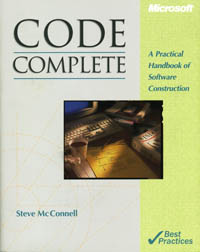This article's lead section may be too short to adequately summarize the key points. (February 2016) |
Code Complete is a software development book, written by Steve McConnell and published in 1993 by Microsoft Press, encouraging developers to continue past code-and-fix programming and the big design up front and waterfall models. It is also a compendium of software construction techniques, which include techniques from naming variables to deciding when to write a subroutine.
 First edition cover | |
| Author | Steve McConnell |
|---|---|
| Language | English |
| Subject | Computer programming |
| Published |
|
| Publication place | United States |
| Pages | 914 (2nd ed.) |
| ISBN | 978-0-7356-1967-8 (2nd ed.) |
| LC Class | QA75.5-76.95 |
Summary
editMcConnell defines the main activities in software construction as detailed design, construction planning, coding and debugging, unit testing, integration and integration testing. Although he does not dismiss the value of other aspects of software development such as requirements and documentation, McConnell emphasises the construction of software due to several reasons. Within the view of the book, construction is a large part of software development, as the central activity within software development and can significantly improve the productivity of a programmer when focus is directed towards it; in addition, the source code is seen as defining the operation of the software, with documentation implicated when code and documentation are opposed. Lastly, the book contends that construction is the exclusive activity which is guaranteed to remain completed.
The techniques of a good programmer are also given throughout the book. The whole part seven of the book is about software craftsmanship (layout, style, character, themes and self-documentation).[1]
The other six parts of the book are: laying the foundation, creating high-quality code, variables, statements, code improvements and system considerations.
Review
editCode Complete has received outstanding reviews, being widely regarded as one of the leading must-reads for software developers.[2][3] It won a Jolt Award in 1993.[4]
There are also negative reviews about the length and style of the book,[5] which runs to over 900 pages and goes into detail on many topics.
The first edition has been superseded by Code Complete 2.[6] The first editions can be found used and are still relevant for programmers using C, Pascal and GW-BASIC [7]
Editions
edit- ISBN 978-1-55615-484-3 First edition (1993)
- ISBN 978-0-7356-1967-8 Second edition (June 2004)[2]
References
edit- ^ "What are the key points of Code Complete?". 2010-09-17. Retrieved 2015-06-28.
But the most important take-aways are in Chapter 33, Personal Character: once you consciously seek to improve as a coder, you can and will. The fastest way to do so is to take on the attitudes of master coders (humility, curiosity, intellectual honesty, discipline, creativity), while also practicing their habits (many good habits are listed in the book, e.g. choosing good variable/value names).
- ^ a b "CC2 ISBN". 2015 ACM, Inc. Retrieved 2015-06-25.
- ^ "Pan Pantziarka review". TechBookReport 2005. Retrieved 2015-06-25.
- ^ Jolt winners 1993 Archived 2009-05-25 at the Wayback Machine
- ^ "Russ Allbery Review Code Complete". 2015-01-05. Retrieved 2015-06-28.
I'm quite disappointed, since I'd heard nothing but praise for this book before picking it up. But it's not for me, and I'm now dubious of its value for any programmer outside of a fairly narrow, large-team, waterfall development process involving large numbers of people writing very large quantities of code in languages that aren't very expressive. And, well, in that situation I think one would get more benefit from changing that environment than reading this book.
- ^ "Code Complete's 2nd edition website". Steven C. McConnell. Retrieved 2018-10-17.
- ^ "CC1". Construx Software. Retrieved 2015-06-25.